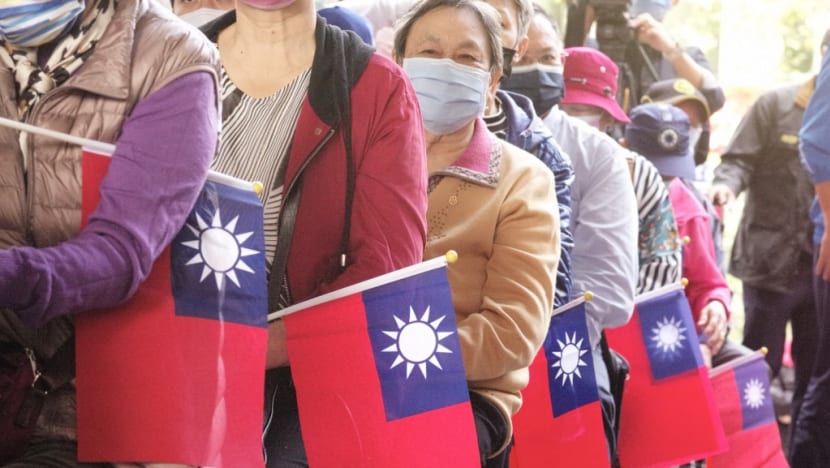Why Taiwan’s 2024 elections matter from Beijing to Washington
Taiwan, a self-governing island that China claims as its territory, is holding elections next year that could have a major impact on US-China relations.

Taiwanese voters will do more than just choose their next president and legislature when they go to the polls in January 2024: They will help set the course for US-China relations for years to come.
Their choice is between a ruling party determined to maintain the self-governing island’s political independence and an opposition that sees closer ties with China as the only viable path.
This leaves Taiwan at the heart of tensions between the world’s two biggest economies. China sees its eventual control of Taiwan as a critical national security issue and doesn’t rule out the use of force to make it happen.
Anti-China sentiment, meanwhile, is a rare area of bipartisan agreement in Washington, where policymakers are pressing to accelerate billions of dollars in arms shipments to Taiwan.
WHAT IS CHINA'S CLAIM?
Colonised by European and Asian powers for centuries, Taiwan’s current status has been in dispute since the end of the Chinese Civil War in 1949, when Chiang Kai-shek — leader of the Nationalist Party that ruled China following the overthrow of the Qing dynasty in 1912 — abandoned the mainland to Mao Zedong’s Communists in the wake of World War II.
Ever since, Beijing has claimed sovereignty over Taiwan, even as the island of 23 million people established a robust democracy and thrived under de facto American protection to become a critical supplier of semiconductors and other high-tech goods.
WHY ARE TENSIONS SO HIGH NOW?
US-China ties have been strained for years over issues from technology to human rights. But Beijing increasingly sees the US as abrogating its decades-long “One China policy,” in which Washington recognised the Beijing-based People’s Republic as the “sole legal government of China” and ended formal diplomatic recognition of Taiwan — without clarifying the US position on the island’s sovereignty.
While US officials say there is no change in policy, President Joe Biden has repeatedly said the US would come to Taiwan’s defence if attacked, breaking with Washington’s longtime ambiguity on the issue. At the same time, members of Congress — both Republicans and Democrats — have rallied around Taiwan.
Then-House Speaker Nancy Pelosi’s visit to Taipei in August 2022 outraged Beijing and sparked one of the biggest Chinese military drills ever seen around the island. Shorter, but still intense, exercises took place again after Taiwan’s President Tsai Ing-wen visited the US in April 2023 and met with new Speaker Kevin McCarthy.
Related:
WHAT'S AT STAKE IN THE ELECTION?
Tsai — who’s unable to run again because of term limits — says Taiwan is at the “front lines” of democracy.
With a four-year term, the next president will serve past 2027, by when the US estimates China wants its military to be capable of undertaking an attack on Taiwan — even if no such move is currently planned.
Tsai has long drawn Beijing’s ire with her contention that Taiwan is essentially already a sovereign nation, even if only a handful of countries recognise Taipei instead of Beijing as the seat of China’s government. Another president who toes Tsai’s policies could see those tensions sustained.
The opposition Kuomintang party, meanwhile, shares a tacit agreement with Beijing that Taiwan is part of China and would likely seek to ensure closer ties with the Communist government.
HOW IS CHINA RESPONDING?
Beijing has generally dialled back the pressure on Taiwan in recent months in what’s seen as a bid to avoid alienating the public and perhaps boost the prospects of the Kuomintang, or KMT.
The KMT’s strong showing in local elections in late 2022 gave the party’s supporters hope that they could have their first presidential victory in a decade — a result that would ease Beijing’s concerns that a formal declaration of independence is looming and lower tensions around the status of the island.
WHO ARE THE LEADING CANDIDATES?
Tsai’s vice president and chairman of the ruling Democratic Progressive Party, Lai Ching-te, was picked as the party’s candidate in April.
The Harvard-educated physician once described himself as a “political worker for Taiwanese independence.” He has toned that down as Tsai’s deputy and says the DPP’s goals are to boost the economy, strengthen national defence and safeguard peace.
The KMT says it will pick its candidate by the end of June: Current front-runners include New Taipei City Mayor Hou Yu-ih and Foxconn Technology Group founder Terry Gou. Another potential contender is KMT chairman Eric Chu.
WHAT ARE THE KEY CAMPAIGN ISSUES?
China policy and the economy.
Elections in Taiwan have typically been dominated by voter views on how the island should handle relations with Beijing. That makes it a litmus test for how nervous voters are about the current state of affairs and where they might lead.
On the economic front, Taiwan cut its 2023 growth forecast in February to 2.12 per cent as weak exports continue to drag on the economy, while inflation risks are increasing, which led to an unexpected rate hike from Taiwan’s central bank.













